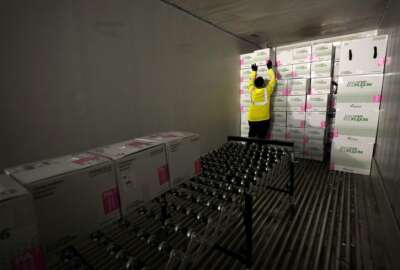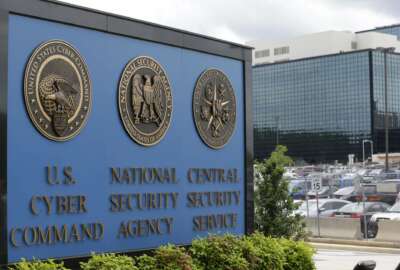

The Business Executives for National Security group has published a call to action to improve emergency national response. With highlights, CEO, retired Army Gen.
Best listening experience is on Chrome, Firefox or Safari. Subscribe to Federal Drive’s daily audio interviews on Apple Podcasts or PodcastOne.
Events over the last couple of decades have shown that the federal government isn’t all that great at responding to crises. No one connected the dots leading to 9/11. Hurricane Katrina, how’d that go? The pandemic, still scrambling. Now the longstanding Business Executives for National Security group has published what it terms a call to action to improve emergency national response. With highlights, the group’s CEO, retired Army Gen. Joseph Votel, and its chairman, retired Booz Allen Hamilton managing partner Mark Gerencser, joined Federal Drive with Tom Temin.
Interview transcript:
Tom Temin: Gentlemen, good to have you on. And reading the early part of your latest report just out a day or so ago, you say that all of the pieces are in place for an inter governmental, vertically oriented and federal response to disasters. And so if all the pieces are in place, what’s the missing piece. so to speak.
Mark Gerencser: What we basically said was, most of the pieces are in place. But frankly, following how we’ve always responded to crises, we’ve typically done them at the state level. And that’s because the way our Constitution is written, the Constitution empowers the states for the health and safety of their citizens. So each state independently built its own capability. And generally, that works pretty well for localized types of events. But when we have something that literally touches all corners of the nation, and persists for such a period of time, a long period of time, just like COVID, is we find that that stresses the system, because what we have is a response that’s let’s say independent states response as compared to a United States response.
Tom Temin: I guess in many ways then, 9/11 for example, was kind of a hybrid because it happened, the actual destruction happened in very localized areas. And yet it felt like it was something the nation as a whole had to deal with, because that kind of thing can happen everywhere. General Votel.
Gen. Joseph Votel: That’s exactly right. In what we’ve kind of looked back over most of our emergency responses over a number of years here, you’ll see as Mark indicated, we generally have done well handling local or regional kinds of emergencies. We can prepare for these to some extent, certainly can’t prepare for a terrorist attack, but the response is much more deliberate in terms of this. And they’re limited in time and duration and geographic area. And so it makes it much easier to concentrate in those particular areas. But what we have now with the pandemic is something different, much different, sustained for now, almost a year across the whole nation, and this I think really exposes some of the weaknesses and challenges within our national emergency response system frankly. And this is what are this is really what our report tried to get after.
Tom Temin: I guess if you postulate that maybe the response wasn’t so good under the Trump administration, maybe one reason was that was perhaps too much deference to the state responsibility in the federal system, as opposed to something that unprecedented at least in a century or so. Could that be one of the causes of the, think you’ve mentioned, the issue this time around?
Gen. Joseph Votel: Yeah, I think that it probably is. We are a federation, so we have a federated response. All of our states have capabilities that are peculiar to them, they have their own lexicon, they have their own organization that goes along with it. So you have essentially to some extent, 50 different approaches. And I think sometimes this does make it a little bit of a challenge. But there really is a role at the national level, of course. I mean, one of the weaknesses I think we identified in this is that we really don’t have a strategy, a national strategy for how we deal with emergencies. In the Department of Defense we have a national military strategy that is subordinate to the national security strategy. We don’t have that on the homeland side and we really need it. And that’s really one of our key recommendations here. And you’ve got challenges with sharing information, you’ve got challenges with clear communication, and all of this is exacerbated by this federated response. And frankly, lack of trust that has crept into, certainly into this most recent situation, but has a tendency to arise when we start operating between different sectors and different levels of government.
Tom Temin: And one of the ways to cure that lack of trust I noted in the report was simply to have regular exercises so that people can work together when it’s not an emergency, but at least get to know each other and understand that everyone does have the same goals.
Mark Gerencser: That’s exactly right. One of the analogies that the general and I used in a recent op-ed piece was if you think about a football game, and we know where the boundaries are, and we sit there spectators and watch the football game, now what happens when you take the boundaries of that field and extend that beyond the field out to the streets that include the stadium, now the spectators are players. And guess what, the spectators don’t really maybe don’t know all the rules. The spectators certainly haven’t learned the plays. The spectators haven’t earned the trust with the team to actually get the ball handed to them. And until we actually incorporate these other players, meaning businesses and citizens into the response, we we don’t have our best foot forward and we have to overcome that through exercising,
Tom Temin: And it’s one element also missing, a certain I guess facility in logistics. I think we learned that in Katrina that Walmart did a better job than anyone else in getting water distributed. And you can’t have giant storehouses of stuff ready all over the country because it goes bad, it spoils, it’s expensive, whereas the business logistics chain can swing into business pretty quickly. Is that part of your recommendations?
Gen. Joseph Votel: Yeah, it really is. We spent quite a bit of time looking in this particular area. And there are several recommendations in our call to action that really focus on this idea of prioritizing the right resources at the right place at the right time. Which is, of course, really what we’re trying to do here. And so one of the recommendations we make is within FEMA, FEMA is really a good organization, however what we really need in there is we need kind of a service center that provides real time situational awareness, can even be used as a place to exchange information between public and private partners in this and kind of have shared data analytics so we understand what’s happening out there. At the same time, we also need to make it easier for business to support this. So we have to have flexible contracting options for businesses and protections, frankly, for them to share information, to share the resources and do it quickly as the nation needs. And it isn’t just about, Tom, about the physical materials, also about people. We make a couple of important recommendations here on something we refer to as a civilian expert reserve, that really is designed to be akin to a National Guard type organization that really recruits trains and maintains and helps employ a rapid response capability of trained professional emergency responders. Medical, engineering, a variety of different skills in there. And then at the same time, we also have to be able to call on the full weight of American volunteerism. One of the things we learned throughout this is there’s no shortage of Americans who want to step forward and help. But what we do have a challenge with is aggregating all that and getting all that and really getting that focus. And that’s not something the federal government can do, we’ve got organizations to do it and we need to incentivize them to do it more broadly so we can really leverage the full weight of the American people.
Tom Temin: Ironically, we used to have a civil defense, whatever happened to that apparatus from the Cold War?
Gen. Joseph Votel: When the threat from nuclear weapons, and everything came with all of that, we really had a mindset of this in our nation. And to some extent, that’s what we have to do, and that’s part of the purpose of having a national strategy, frankly, for people to think about how they contribute to this and how we resolve these problems.
Tom Temin: And, Mark, I wanted to ask you about the information sharing recommendation that you mentioned briefly, we’re not past that yet. And that was connecting the dots. That was the whole 911 topic. And it sounds like there’s still a shortfall there too.
Mark Gerencser: Yes Tom there is. And this shortfall though is sort of categorically different than what we saw at 9/11. 9/11 was information sharing amongst government entities, that’s working better. But we need information sharing beyond the government entities, information sharing with private businesses who can help, who can provide those supplies, for example, who can retool their supply chains if they need to, or re-leverage or repurpose the distribution channels. That also applies to sharing information to the citizens. We keep talking about if we’re going to work together as a network, we need to communicate as a network. And that’s where it breaks down. Now, the good news is, given today’s technology with cloud and hybrid cloud computing, there are easier ways for us to now share and get connected without having to redesign our own systems. And so we think what has to happen is an overlay, a technology overlay put into all the stakeholders hands so that they can communicate and create, for example, common operating picture.
Tom Temin: Yeah, because here we are still with websites that crash or don’t have all the rules built into them for this COVID distribution, the vaccine distribution, and you hear the frustration across the TV airwaves. So this reports pretty comprehensive, what happens to it next?
Gen. Joseph Votel: This is not a think tank, this is a do tank. So we’re really focused on the implementation of this. We’ve been meeting with members of the new administration as they were going into position. And we’ve been meeting with members of Congress. And what our focus is now is moving forward with our partners in the government and the administration and Congress, and with the broader business and civil community, and really trying to work to implement these recommendations. And that will really be the real the principal focus for us in the coming months. We’re really excited about it.
Tom Temin: Joseph Votel is president and CEO of the Business Executives for National Security. Thanks so much for joining me.
Gen. Joseph Votel: Great to be with you Tom.
Tom Temin: And Mark Gerencser is the chairman. Thank you as well.
Mark Gerencser: Thank you Tom. Good to be with you.
Copyright © 2025 Federal News Network. All rights reserved. This website is not intended for users located within the European Economic Area.
Tom Temin is host of the Federal Drive and has been providing insight on federal technology and management issues for more than 30 years.
Follow @tteminWFED


